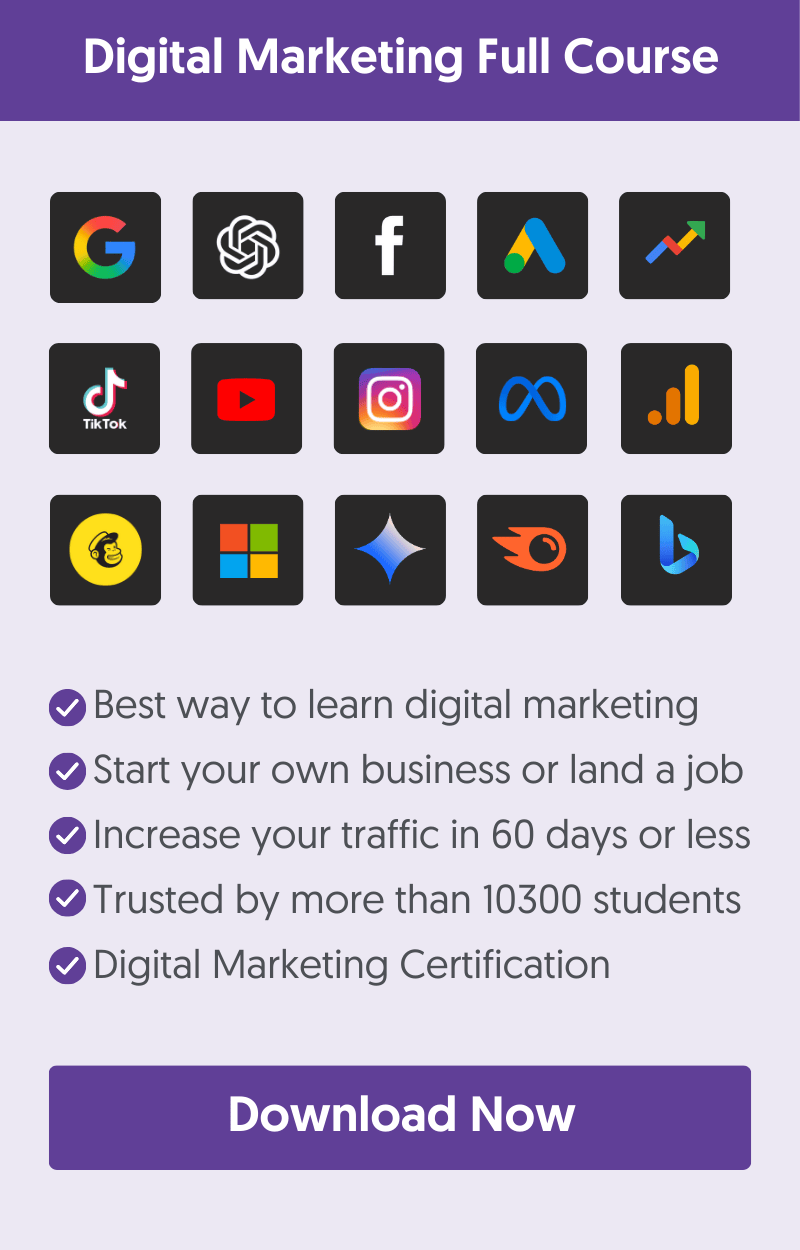The demand for social media marketing agencies is higher than ever. Businesses of all sizes are investing heavily in social media because it’s one of the most powerful ways to reach and engage with their audience.
Starting your own social media marketing agency (SMMA) can be a rewarding way to build a profitable business, even if you have no prior experience. With the right strategy, you can help clients grow their online presence while creating a steady income for yourself.
In this guide, I’ll walk you through the essential steps to start your own SMMA from scratch. This advice comes from over 15 years of hands-on experience providing social media marketing services to clients and building a successful agency from the ground up.
What Does a Social Media Marketing Agency Do?
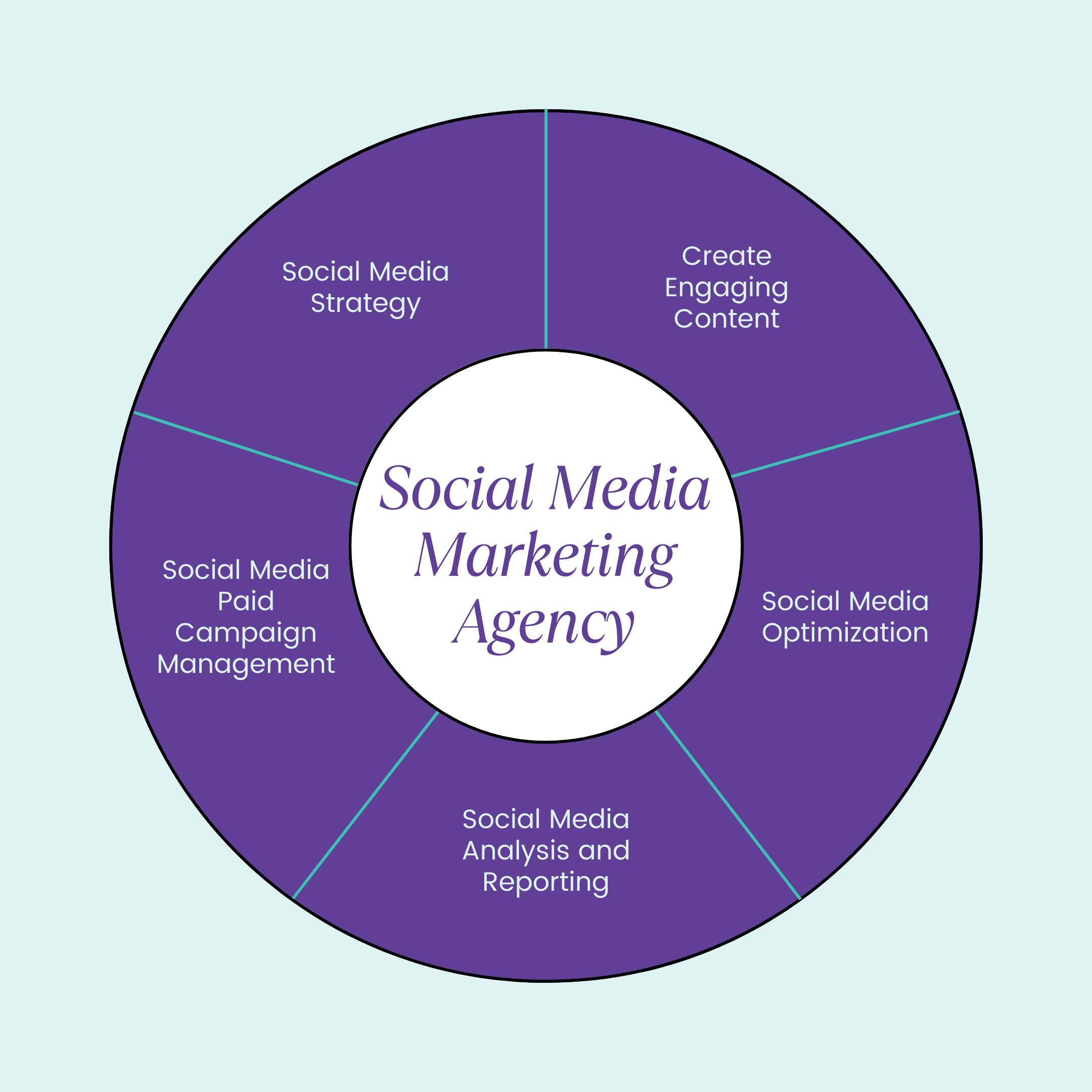
A social media marketing agency helps businesses build and maintain a strong presence on social platforms. These agencies use their expertise in social media strategies, tools, and content creation to manage accounts and drive results.
Their main goal is to help clients increase brand awareness, grow their audience, and improve their return on investment (ROI) through effective social media campaigns.
While services can vary, most social media marketing agencies offer solutions in three key areas:
1. Strategy Development
Agencies help clients create tailored social media strategies for each platform. This includes planning paid and organic campaigns, setting goals, and advising on engaging with customers effectively.
2. Content Creation
From writing captions and ad copy to producing eye-catching visuals like videos and graphics, agencies ensure clients have engaging content that resonates with their audience.
3. Analysis and Optimization
Agencies continuously track and analyze campaign performance to improve results. They provide data-driven insights, optimize strategies for better ROI, and often deliver reports informing clients of their progress.
Is SMMA a Good Business to Start?
Interest in social media marketing has grown consistently worldwide over the last ten years. By 2027, experts predict the market for social media advertising will grow to a value of $247.30 billion.
If you have creative skills, know your way around social platforms, and have a mind for data and analytics, creating your own social media marketing business could be a profitable endeavor.
Additionally, this career path offers other benefits, such as:
- Flexibility: Social media marketing agency owners can control everything from the services they offer and the clients they serve to their work hours.
- Remote work: You can manage and run your entire business remotely or from your home. There is no need to meet clients in person, everything can be executed remotely.
- Minimal startup costs: The startup costs for a social media marketing agency can be quite low. Typical expenses include website hosting, social media tools, and training.
- Scalability: You can scale your business as much as you like, working with all kinds of clients.
- Unlimited potential: Depending on your skills, and your willingness to work with other experts in your industry, you can offer a wide range of services. You might decide to combine social media marketing with other digital marketing services.
- Exciting work: With a social media marketing company, you can work with various clients in different industries. Meeting new people, constant learning, and growth are what make social media marketing a great business to start.
Moreover, since you set your own rates as a social media marketing agency, your potential income is limitless.
How to Start a Social Media Marketing Agency
These are the key steps to follow when starting your own social media marketing business.
- Design Your Brand's Tone and Voice
- Register Your Online Business
- Set Prices & Prepare Social Media Packages
- Become an Expert in Facebook Ads
- Get To Know Social Media Advertising Platforms
- Start a Social Media Marketing Blog
- Prepare Client Pitches
- Hire a Graphics Designer
- Get Your First Client
- Scale Your Agency
1. Design Your Brand's Tone and Voice

The first step in starting any successful business is creating a brand that connects with your target audience.
Your brand identity connects you with your chosen customers and differentiates you from the competition.
It’s more than just a logo or website design. The right brand needs to speak to your customers on an emotional level.
Start by choosing a niche you want to focus on. For instance, you might specialize in social campaigns for financial professionals or concentrate on a specific channel, like Facebook or TikTok.
Once you have your niche, examine the competitors in your market to find a unique selling point.
Your “USP” identifies why customers should choose you over the competitors for a specific service.
Your USP might relate to the packages and support options you offer, or it could be related specifically to your niche.
Once you have your niche and USP, make sure you:
- Choose a memorable name: Your name is an important part of your brand identity, and it’s crucial to ensure customers can find you. Make sure you select a name that’s easy to spell, type, and say out loud.
- Establish your social media presence: As a social media marketing agency, you should have a fantastic presence on all of the channels you’ll use for your clients. Set up your own social media campaigns and monitor their results.
- Differentiate yourself: Draw attention to what makes you different from your competition. Share your unique tone of voice and brand identity across every channel, and concentrate on building deep relationships with your audience.
2. Register Your Online Business
Next, you’ll need to ensure you have everything set up for your online business from a legal perspective.
Depending on where you’re located, you may need to apply for a business permit.
However, at the very least, you’ll need to register your company with your government to receive a tax number and ensure you’re ready to report your income.
If you’re worried about handling taxes yourself, it might be worth seeking support from a professional accountant or bookkeeper who can help you monitor everything.
Ensure you have a strategy in place for accepting payments from your customers. You need to register with a payment provider like PayPal, Square, or Stripe to issue invoices and receive payments.
If you want to avoid issues with your competition swooping in and trying to steal your brand identity, you could consider getting a trademark for your name and logo.
3. Set Prices & Prepare Social Media Packages
Establishing the right rates for your social media marketing agency is one of the most challenging parts of launching your new business.
You’ll need to ensure your prices are competitive so that you can attract as many clients as possible. However, it’s also crucial to ensure you’re making a consistent profit.
When establishing your pricing, make sure you examine your running costs carefully.
Your pricing structure should ensure you can cover all the costs of things like software licenses, marketing campaigns, office expenses, employee salaries, your salary, accounting and legal costs, and so on.
Once you have an idea of your running costs, you can determine how you want to charge for your services.
Some companies offer a monthly retainer fee for customers, which provides access to all of their services for a fixed cost. Others offer project-based pricing or charge fees on an hourly basis.
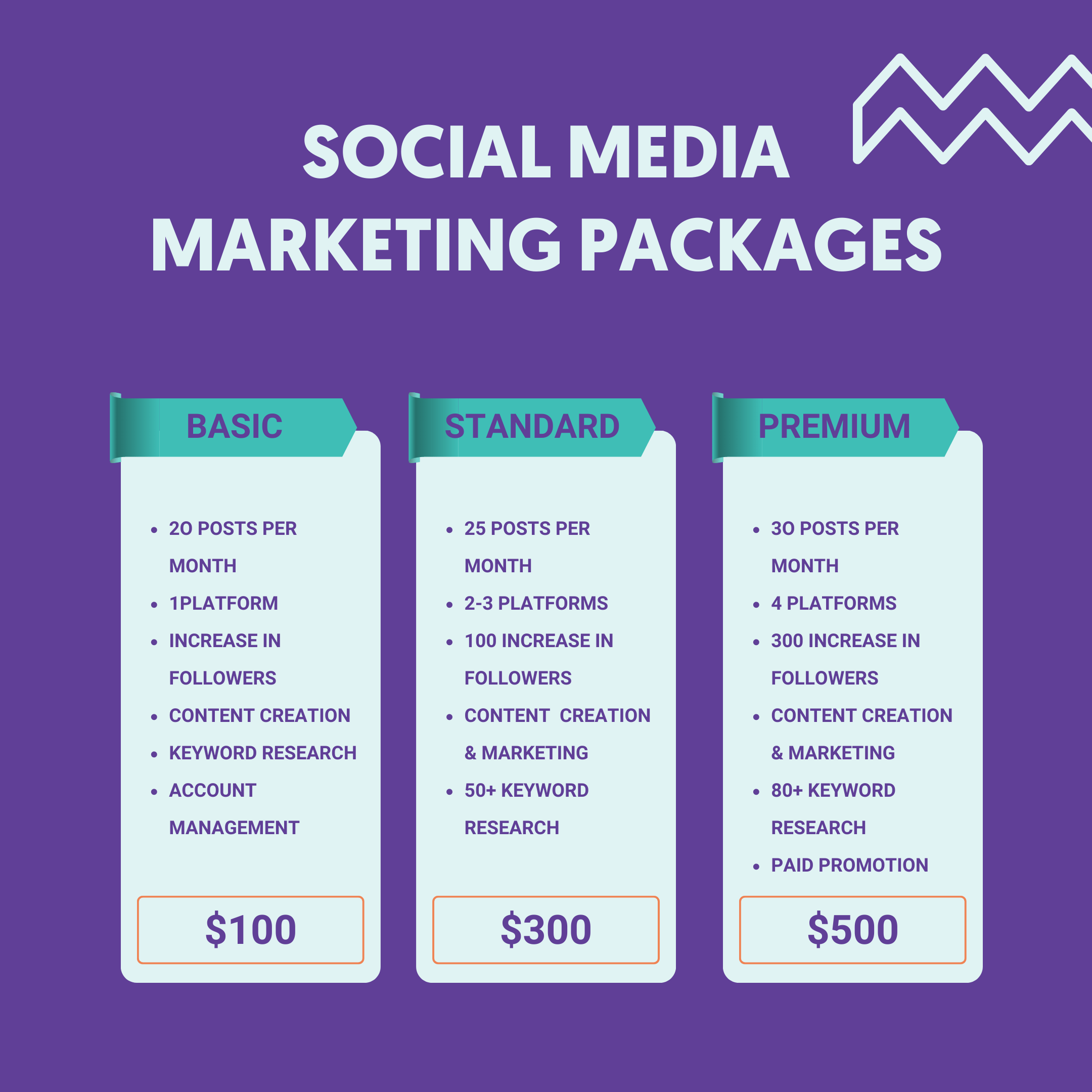
Creating pre-defined packages for your target audience is one of the easiest ways to ensure you can make a consistent profit. Offering a range of packages specifically tailored to your customer’s needs will make it easier for them to choose how they want to work with you.
For instance, you could offer a “starter” package which includes consultation, research, and guidance, as well as a more advanced package with content creation and automation included.
Keep your package options simple, and ensure they address the pain points and goals of your target audience.
4. Become an Expert in Facebook Ads

Most social media marketing companies offer services that cover a variety of platforms, from Instagram to TikTok.
However, while the platforms you support may vary depending on your business model, most clients will expect you to excel in Facebook advertising.
Learning how to use tools like the Meta ad manager will ensure you can support your customers across both Facebook and Instagram.
The strategies you use to target customers and generate campaigns for Facebook will also help to guide your work on other channels.
When mastering your Facebook advertising skills, focus on the following:
- Earning certifications: Acquiring social media certifications, such as the Meta certifications, will help you hone your skills and earn customer trust.
- Using the FB Business Manager tools: Learn the ins and outs of Facebook business manager. Ensure you understand how to configure events, custom conversions, and design different ad campaigns.
- Managing audiences: Facebook Ads can be tailored to specific customers, including custom and lookalike audiences. These tools will help you to reach specific customers at scale.
- Creating campaigns: Make sure you know how to create and launch various different kinds of campaigns, from video ads to sponsored campaigns on Instagram and carousels.
It’s also worth ensuring you stay updated with trends and algorithm changes on Facebook, so you can adapt your campaigns as the platform evolves.
To learn more, visit the resources below.
5. Get To Know Social Media Advertising Platforms
While Facebook is currently the most popular social media platform, this doesn’t mean you should be avoiding other channels. As a social media marketing agency, you’ll need to be able to support your customers on everything from TikTok to Pinterest.
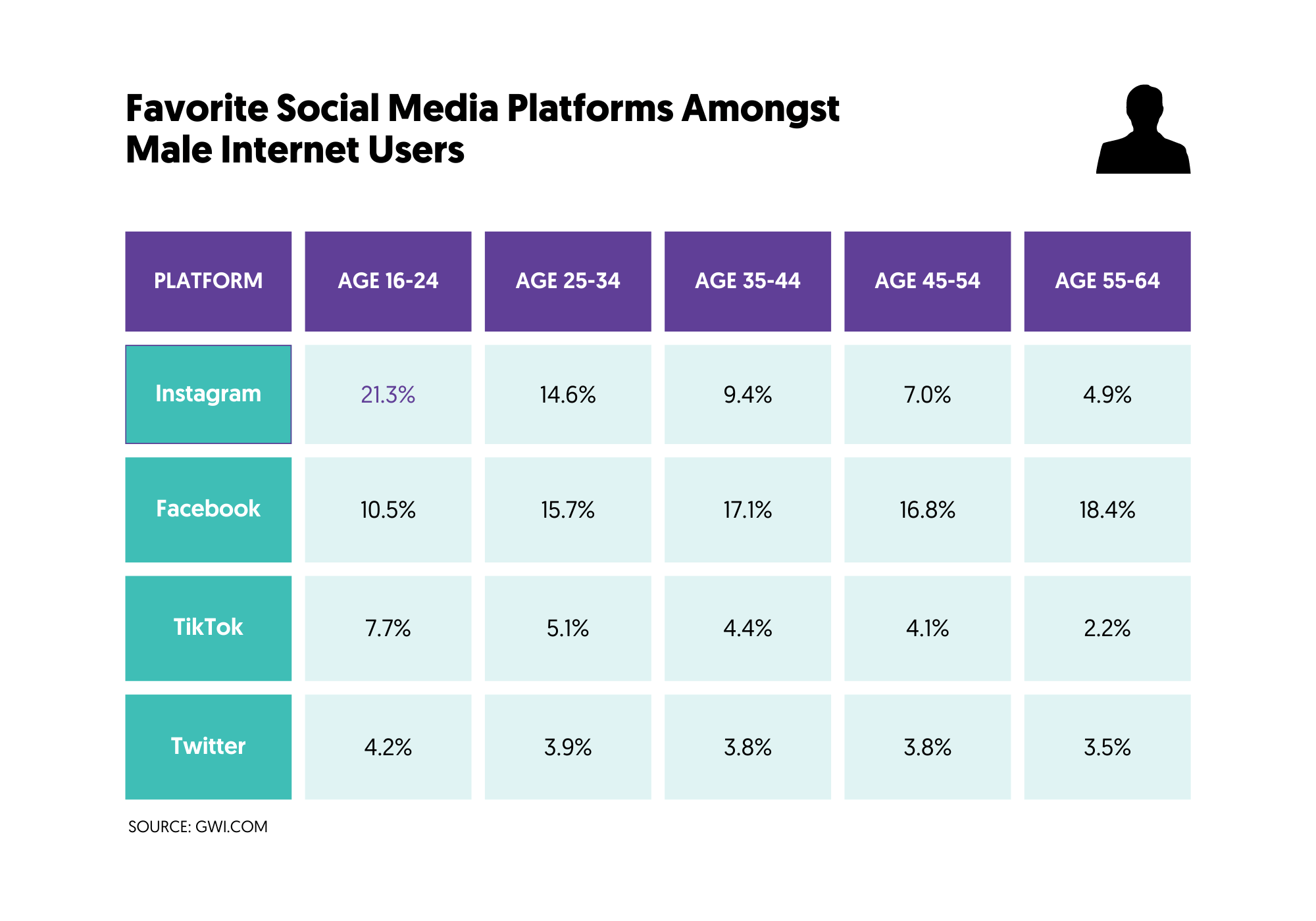
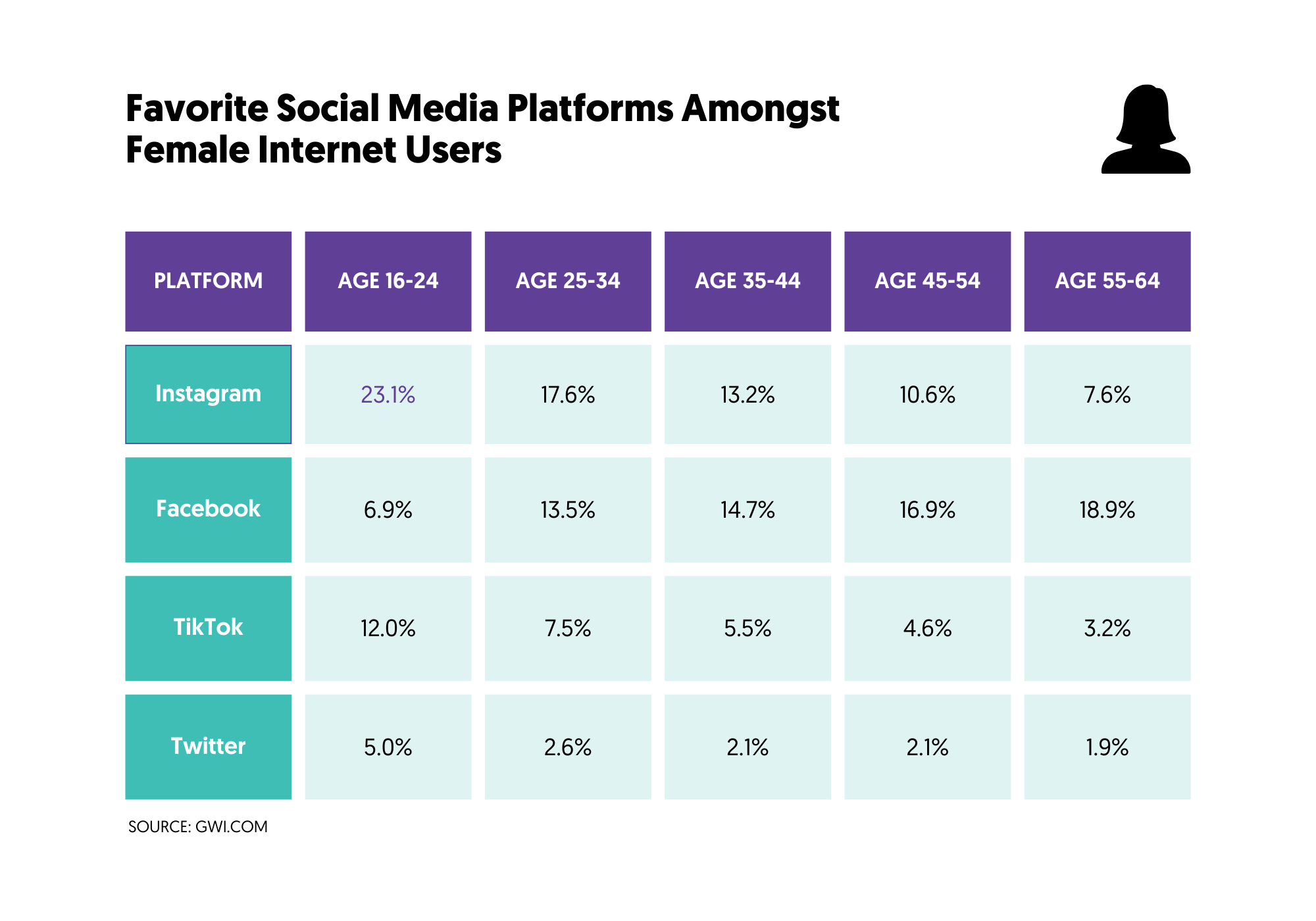
Learning how to use all of the different ad platforms is crucial. Make sure you develop a deep knowledge of:
- LinkedIn Ads: The paid marketing tool for LinkedIn promotion. LinkedIn ads offer access to a host of marketing tools, as well as retargeting solutions, campaign optimization software, and various reporting and analytical tools.
- Twitter Ads: Twitter ads allow companies to access paid advertising opportunities in a bid format. You can design how much you pay for each billable action, like getting customers to click on your campaigns or increasing impressions.
- TikTok Ads: TikTok’s ad manager allows companies to showcase promoted content, such as full-screen videos, to a specific target audience. You can also use TikTok to find and work with influencers in your niche.
- Instagram Ads: Instagram ads use the same technology as Facebook, as both platforms are owned by the parent company Meta. You can choose exactly how you want to run an ad campaign and which audience you want to reach.
- Pinterest Ads: Pinterest ads allow companies to place pins in areas where they’re most likely to generate attention from a specific target audience. You can create video, or image-based ads for a range of customers.
It’s also worth learning how to utilize social media management tools to your advantage. Solutions like Buffer and Hootsuite can help you with scheduling and creating ad campaigns, monitoring campaign results, and creating reports for clients.
These tools are particularly valuable for agencies, as they offer a range of ways to automate your campaigns, so you’re less likely to spend too much time on manual tasks.
6. Start a Social Media Marketing Blog
As the demand for social media marketing continues to increase, it’s important to ensure you can stand out from the competition.
Having a strong presence on social media, yourself is a good way to get started. However, you’ll also want to work on increasing your online presence elsewhere.
Creating your own website and blog is a valuable way to boost your chances of earning clients.
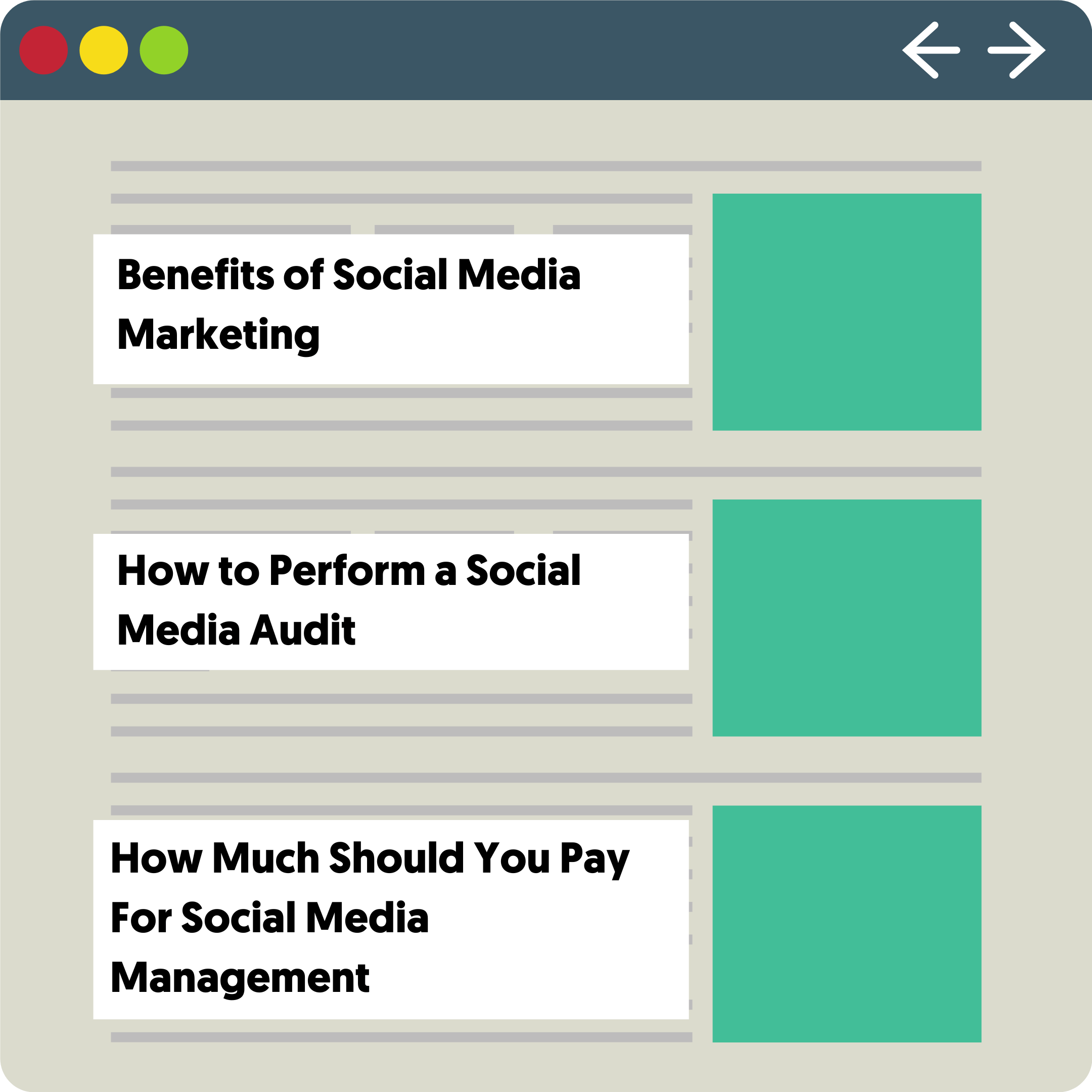
Your blog gives you an excellent opportunity to establish authority and thought leadership in your space. Plus, with the right SEO strategies, you can increase your visibility on the search engine result pages.
On your blog, you can cover things like:
- How-to articles: How-to articles can provide your potential customers with valuable information about managing certain social media tasks, like creating a target audience or designing effective ad campaigns.
- Industry insights: A blog can also be a great place to demonstrate your position in the social media market, with insights into the marketplace, industry news, and similar topics. You can even provide social media algorithm guidance.
- Customer stories: Customer stories are a fantastic way to gain customer trust and demonstrate credibility. If you can share information about how you helped a client to improve their online presence, this could help you attract new clients.
You can also use your blog to share examples of campaigns you ran in the past, draw attention to customer reviews and testimonials, and share opinion pieces from employees.
7. Prepare Client Pitches
Now you’ve established a strong presence for your social media marketing agency, the next step is preparing pitches to take to clients. Pitches allow you to approach potential clients with your services in a tailored format.
The best pitches will be specific to your customer’s needs and goals. With that in mind, it’s worth creating user personas that allow you to step into your customer's shoes and consider their requirements.
A pitch is also a good opportunity to establish trust and show authority. You can link customers to your own social media sites to show how much you know about the industry.
You could also consider sharing testimonials, reviews, and case studies from customers similar to your target client.
Provide insights into the kinds of services and packages you offer, and consider suggesting recommended options based on what you learn about your prospects.
8. Hire a Graphics Designer
The size of your social media marketing agency and the number of employees you hire will vary depending on various factors.
However, unless you have all the skills required to create visual content yourself, you may need to hire a designer in the early days.
A graphic designer will be able to help you with creating images, visual ads, videos, and other content you can use to both market your business and support clients.
Depending on your existing skills and the services you offer, you might also consider hiring some other team members.
You can employ these staff members full-time, work with contractors, or even source freelance employees. Common team members include:
- Social Media Managers: to handle client accounts and run paid campaigns.
- Content writer: A content writer can help you create compelling copy for paid and organic campaigns, as well as content for your social media marketing blog.
- Digital Marketing Specialists: they can help you provide a wider range of services to clients besides social media marketing services.
9. Get Your First Client
As a social media marketing agency, you’ll need to invest a significant amount of time into finding and retaining clients. Finding your first client can be difficult if you have no prior experience or background in your industry.
Once you’ve developed a strong online presence, pricing strategy, and a pitch for your services, you can begin to experiment with different ways of finding clients, such as:
- Using LinkedIn: LinkedIn is an excellent place to source business clients in search of support with social media. You can join social media marketing groups, answer questions asked by other users, and proactively reach out to potential clients.
- Leverage your online network: If you already have connections on social media, consider asking them to refer your company to businesses that might need your help. You can also create loyalty and referral programs for the future.
- Run events: Hosting webinars and online events can be an excellent way to find new leads. You’ll be able to showcase your expertise during these events, and use them to capture email addresses you can use to nurture possible clients.
- Job sites: Sites like Upwork, freelancer and others, are great for finding clients for your SMMA.
10. Scale Your Agency
After you’ve started acquiring leads and clients regularly, the next step is to start thinking about scaling your agency. As tempting as it can be to look for ways to grow as quickly as possible, remember that a larger business will require more work to run.
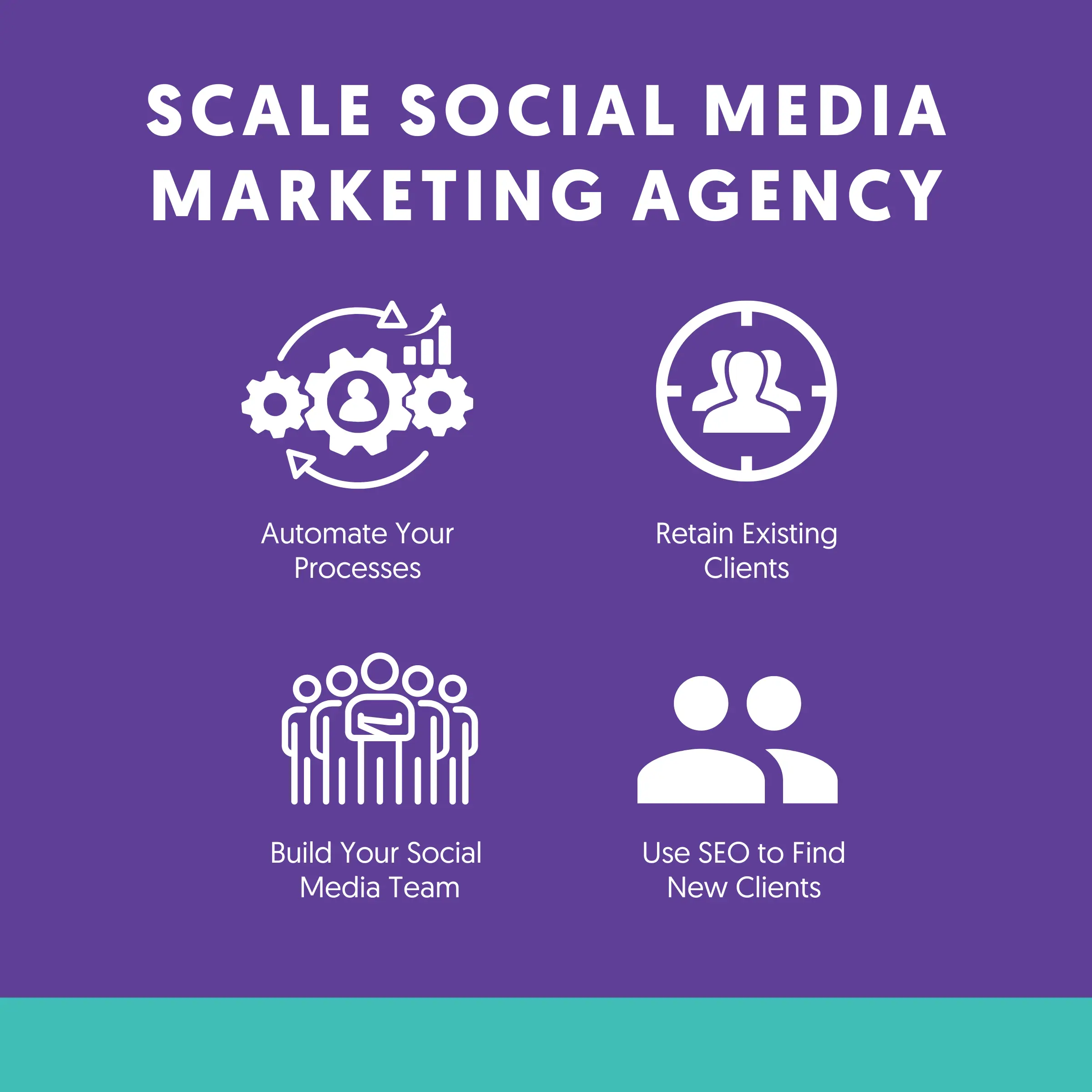
You’ll need to take steps to ensure you can scale consistently and efficiently. Start by looking for ways to optimize your processes by automating repetitive tasks and simplifying client management strategies.
Document everything you do, and collect as much information and feedback as you can from previous clients. This will help you to improve your work processes and also ensure you’ll have access to social proof you can use to advertise your services.
Remember, as your company grows, you may also need to hire additional people to help with client management, social media campaign production, and other aspects of your business. Do your research and select the right talent to join your team carefully. Avoid scaling too quickly with too many employees, as this could harm your profits.
